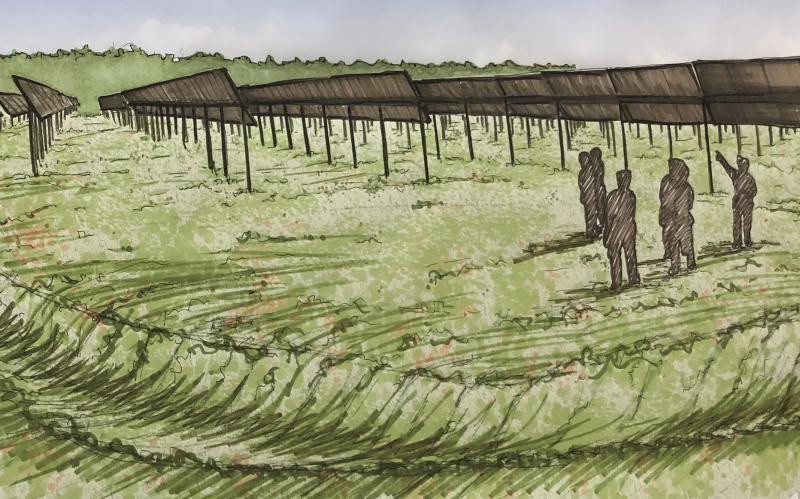Solar panels over farms getting another look
A solar company hopes to bring new light to a proposal to allow struggling farmers to build solar panels over their crops.
The idea, which was initially pitched in the form of a Fall Town Meeting article by solar company NextSun Energy, was pulled from the Town Meeting warrant on the floor due to a myriad of legal, ethical, policy, and fairness questions. The proposal would have allowed the town’s cranberry farmers to build solar panels on their properties over their crops.
It was part of an attempt to bring the state’s Solar Massachusetts Renewable Target (SMART) program to Dartmouth. The program encourages the expansion of solar production in the state on suitable agricultural land.
On Nov. 5, NextSun Vice President of Development Adam Schumaker was again before the Planning Board, this time seeking input and guidance from board members on how to proceed with a more focused and involved bylaw proposal.
“It seemed like there was some general interest in this dual-use agricultural solar project concept, and implementing it in Dartmouth,” Schumaker said.
Schumaker read off what he viewed as the most contentious points the Planning Board raised when debating the bylaw before Fall Town Meeting. Ultimately, the board voted unanimously to not recommend its passage. Among the questions officials are considering: Whether to narrowly tailor the program to just cranberry farms, or open the program up to all farmers, whether the solar farms should generate enough power for the farm, or export power to the grid, needed protections and regulations, and which types of farms should qualify.
Board members, however, still have their concerns with the idea. Under the original bylaw proposal, it would be limited to farms which have been in operation for five years and actively produce crops.
“It’s that whole question of if this overtakes the farming,” said member John V. Sousa. “That’s scary to me if it becomes ‘hey, this [solar] farm is sitting here, so why am I farming? Crop yields go from hundreds of barrels to 10?”
Schumaker acknowledged that while the Department of Energy Resources regulations do require farms to be in operation to be eligible for the program, what constitutes an ‘operating farm’ can be ambiguous. He did note that the idea of yield requirements could be problematic, but did recommend another metric to ensure farms are being maintained and operated.
“Do I happen to agree with this? I do,” said member Lorri-Ann Miller. “I grew up on a farm. I know how hard it is. It’s a short season and farmers are having a very hard time here making ends meet.”
Other members, however, were not convinced the public would be as receptive to the idea. Sousa recalled a grassroots revolt against a bylaw passed years ago, which opened up solar development in residential areas.
When the first solar field opened in Hixville, Sousa said many complained about aesthetics of the units near homes, and led an initiative to modify the bylaw to only apply in industrial areas.
“It’s the aesthetics, in my opinion,” Sousa said. “When we had a few here, people were just totally disgusted with the aesthetics.”
Schumaker said he plans to meet with town officials, residents, and the Agricultural Commission to get more feedback on the plan and how to best move forward with a town-sponsored article for Town Meeting.















